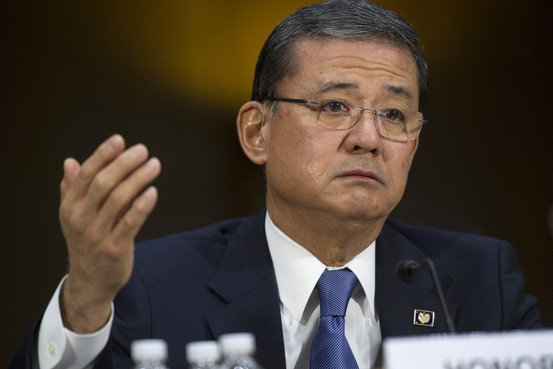‘Serious Conditions’ at Phoenix Veterans Affairs Office, Watchdog Says
< < Go Back
Some Democratic Senators Join Republicans in Urging Shinseki to Step Down.
A watchdog’s report found systemic problems at Department of Veterans Affairs health-care facilities, including improper procedures for scheduling patient appointments and efforts to hide excessive wait times, increasing the pressure on embattled VA Secretary Eric Shinseki.
The interim report by the VA’s independent inspector general focuses on the Phoenix VA Health Care System in Arizona, where wait times for patient appointments were improperly reported, but also points to widespread scheduling problems throughout the VA health-care system.
“Our reviews at more VA medical facilities…have confirmed that inappropriate scheduling practices are systemic,” the report said. The inspector general said it had identified potential criminal and civil violations, and is coordinating efforts with the Justice Department.
The report led to new calls in Congress for Mr. Shinseki to step down. A senior administration official said President Barack Obama’s recent comments indicate Mr. Shinseki is on probation—and that hasn’t changed. Mr. Shinseki didn’t comment on his plans Wednesday, but in the past has said he doesn’t plan to leave office.
Release of the report sparked an immediate bipartisan outpouring of calls for Mr. Shinseki’s resignation. For the first time, Democratic senators, including Sens. Mark Udall (D., Colo.) and John Walsh (D., Mont.), joined Republicans such as Sen. John McCain (R., Ariz.) in urging the former general to step aside.
On Wednesday evening, three top VA officials under threat of subpoena faced hours of withering bipartisan criticism from members on the House Committee on Veterans’ Affairs.
“What I don’t understand is, as a veteran, as a doctor, as a practitioner, how you can look at yourself in the mirror and shave in the morning,” Rep. Phil Roe (R., Tenn.) told Thomas Lynch, assistant deputy under secretary for health for clinical operations at the VA, who carried out the department’s initial review of the problems in Phoenix.
Mr. Lynch described the review’s conclusions as “unacceptable” and conceded that the VA should have taken a more critical look at the problems. “I think people lost sight of the real goal of the VA—which is treating veterans,” he said.
n 2013, the VA health-care system had 8.92 million enrollees, being treated at more than 800 outpatient clinics, 300 VA centers and 150 hospitals. Not all veterans rely on VA care, often using private insurance, Medicare and Medicaid, and not all qualify for care. To receive VA care, a veteran typically has to have retired from the military or suffer from a long-term injury sustained while in the service. Combat veterans of Iraq and Afghanistan can qualify for five years of health care in the VA system after an honorable discharge.
More From The Wall Street Journal (subscription required):




